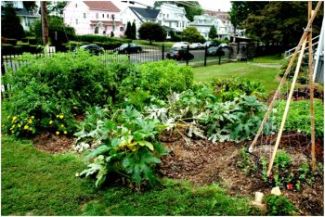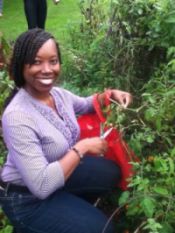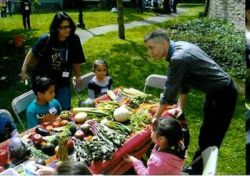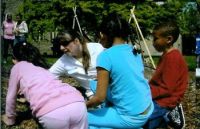EAT, PLANT, LEARN

CNR students and faculty establishing
the garden bed behind Gill Library. Roxanne Zimmer steers the wheelbarrow.

The bounty of the first crop.
Think of the blackboard moving out of the classroom. That’s part of why we established a campus garden at the College of New Rochelle.

Sharing the harvest
with CNR students.
As faculty we are reminded that our students want to know more about the food they eat. These topics include nutrition, wellness, industrial agriculture, food miles and distribution, food quantity and quality.
New classes in the School of Arts and Sciences (SAS) address these matters in whole or part such as a sociology course, Food for Thought, and a physical education elective, Healthy Eating.
Two of the SAS capstone courses, Environmental Justice and This Land is Your Land, also explore matters of the US food system.
The campus Sustainability Garden located behind Gill Library gives students first-hand experience as a place to better understand how and where food grows.

Trinity School students on a field trip
to the CNR Garden.
We engage students in aspects of the process: raising plants from seeds in the greenhouse, transplanting seedlings, watering, weeding, tending the garden and sharing the harvest with the College community.
Too, CNR educates the next generation of teachers.
Teachers can increasingly expect to tend or develop a school garden as the “Edible School yard” movement is sweeping across the country.
CNR colleagues Dr. Faith Kostel-Hughes and Dr. Diane Quandt developed curricular materials around New York State standards in science and math for CNR student teachers.

Dr. Faith Kostel-Hughes shows children
how to plant in the garden.
When they enroll in a joint course offering of the Biology and Education programs, prospective teachers design readings, workshops and projects in which children engage in age-appropriate learning about plants, photosynthesis, worms and other decomposers, soil and food. Children in nearby Trinity School participate in hands on workshops at the CNR garden each spring.
The campus food service also contributes to the garden effort. The daily supply of egg shells and coffee grinds are separated out of the waste stream and placed in the compost pile to replenish the soil with organic amendments.
Funding from the George Candreva Foundation supports the Sustainability Garden and curricular materials for Education students.
For more information, Click Here or contact Roxanne Zimmer, at rzimmer@cnr.edu
